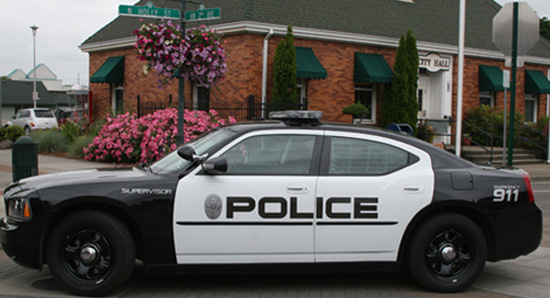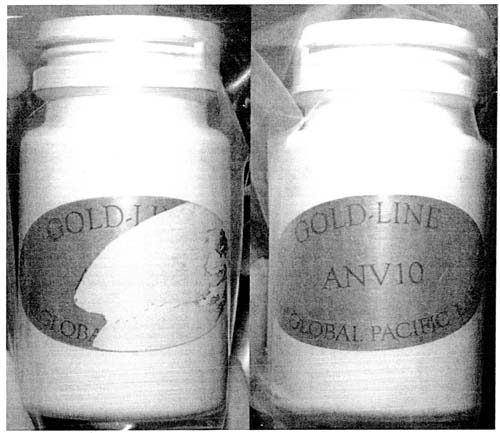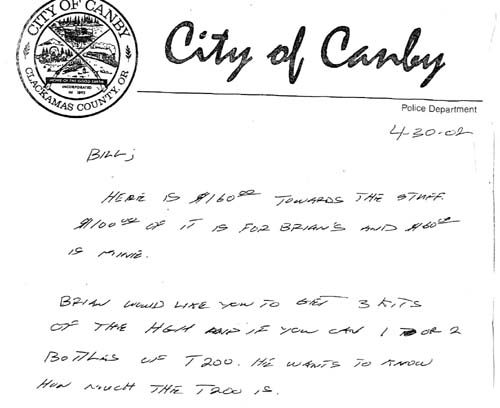The Federal Bureau of Investigations (FBI) Portland Office launched a public-corruption investigation involving the role of the Canby Police Department in a steroid distribution network according to an investigative report by Maxine Bernstein of the Oregonian. Federal investigators allege that Canby police officer Jason Deason openly purchased anabolic steroids and growth hormone from local steroid sources and tipped off his suppliers to any police inquiries; furthermore, Canby Police Chief Greg Kroeplin was aware of his housemate Deason’s involvement with local steroid sources and not only failed to act upon it but may have actively covered it up. Officer Deason even submitted purchases for anabolic steroids and growth hormone on official Canby Police stationary (“Canby cop bought steroids on the job, FBI says,” November 15).
Federal agents this year launched a public-corruption investigation, revealing a cozy relationship between Kroeplin and Deason in the 24-member force that allowed the officer to brazenly buy steroids while on duty and in uniform and tip off his suppliers to police inquiries, according to multiple search warrant affidavits filed in U.S. District Court.
Canby police supervisors either failed to address the problem or concealed it, federal authorities allege in the court documents. The investigation also uncovered a steroid distribution network that operated in Oregon, Washington and Arizona.
No charges have been filed in an ongoing investigation by the FBI Portland Office. The Oregonian reports that Canby officer Deason purchased anabolic steroids and human growth hormone from local steroid sources William Traverso, of Canby Landscape Supply, and Brian Jackson, the former strength and conditioning coach for the Oregon City High School girls basketball team. All three worked out at Nelson’s Nautilus gym in Oregon City.
William Traverso is apparently cooperating with federal investigators after the FBI raided his house on July 30, 2008 and found two containers of steroids from the underground lab (UGL) Goldline Global Pacific Labs containing Winstrol and Anavar. Traverso identified Officer Deason as a steroid customer and Brian Jackson as his primary supplier of steroids.
FBI agents search the house and vehicles of Canby businessman William Traverso on July 30, while another team of agents raid Canby Landscape Supply, where Traverso works. They seized two canisters of Winstrol and Anavar steroids from a safe in Traverso’s bedroom, drug records and two stolen guns. According to a search warrant affidavit, Traverso was recorded during the investigation telling an FBI informant, “I ain’t taking it for no cop.” He later admitted to the FBI he sold steroids to former Canby Officer Jason Deason.
[…]
From 2002 through 2005, Traverso said, Jackson was his main supplier of steroid pills, so he could maintain muscle tone without injections. Traverso admitted to the FBI he typically bought 50 to 100 pills of three kinds of steroids at a time, paying Jackson $2 to $3 a pill. In July, FBI agents confiscated two white canisters of steroids from a safe in Traverso’s bedroom that he said he bought from Jackson.
Traverso admitted selling steroids and human growth hormone, or HGH, to Deason. He also gave federal agents an order for steroids that Deason had given him, written on Canby police stationery.
Former coach Brian Jackson is apparently cooperating with federal investigators after the FBI searched his house on September 12, 2008. Jackson identified William Traverso and Officer Jason Deason as customers and Rainbow “Bo” Wild Keepers as his source for steroids.
On Sept. 12, agents searched Jackson’s home and seized drug records. Jackson had been terminated from his paid assistant coaching job with the Oregon City High School girls basketball team for “just getting a little too close to students,” said Reece, the athletic director. He was with the team three years.
Jackson, with his attorney, began cooperating with federal authorities shortly afterward. He identified his source for steroids as Vancouver resident Rainbow “Bo” Wild Keepers, 39, a competitive bodybuilder and photographer. Agents ran Keepers’ name in federal databases and discovered that an Arizona man had tipped off the Drug Enforcement Administration years ago that Keepers was his source of steroids. Keepers was never charged.
Jackson estimated he made at least 75 steroid buys from Keepers between 2005 and 2007. He’d call in his orders for steroids in pill and injectable form then meet Keepers in parking lots in Portland and Oregon City to exchange cash for the drugs. Jackson told the FBI he sold to Traverso, Deason and an unidentified university public safety officer, court affidavits show.
Officer Jason Deason has denied the use of anabolic steroids to federal investigators.
Deason, in his first interview July 2 with federal agents, denied any use of steroids but said he was aware of the rumors swirling. He told them he achieved his 6-foot-1, 270-pound muscular build through a serious weightlifting regimen and diet with nutritional supplements. He called Traverso a “good friend” whom he met at the gym.
Canby Police Chief Greg Kroeplin has been accused of overlooking or ignoring complaints about Officer Jason Deason’s involvement with the steroid black market since 2001. During this time, Kroeplin allegedly received numerous domestic abuse complaints from Deason’s ex-spouses, a detailed report from an outside law enforcement agency detailing Deason’s steroid involvement, and complaints about Deason from a Canby detective (who was subsequently demoted).
Ironically, Canby Police Chief Greg Kroeplin was unavailable for comment for the Oregonian story since he was attending a law enforcement conference advising police leaders around the country on ways to reduce “roid rage” in law enforcement. Phoenix Police Commander Kim Humphrey spoke about eliminating steroid use by police officers through steroid testing and other means at the International Association of Chiefs of Police Conference in San Diego on November 9, 2008.
Scott Henson, of the criminal justice blog Grits for Breakfast, believes their are good arguments for steroid use by police officers and that steroids should probably be legalized since the side effects from anabolic steroids are relatively modest. BUT Henson believes steroid use by law enforcement is a serious problem because the illegal status of anabolic steroids makes law enforcement vulnerable to corruption.
[A]s long as steroids are illegal, when cops purchase and use them it opens them up to blackmail, corruption, and participation (at varying levels) in black market drug rings.
Certainly there are good arguments for police officers wanting to take steroids, and I’m actually quite sympathetic to the idea that they ought to be able to do so. My personal view is that steroids, like marijuana, pose modest risks that are knowingly taken by those using the substances, and probably should be legalized. But as long as steroids are illegal, making sure cops don’t participate in an illicit drug culture is a LOT more important than policing baseball players.
The real problem with cops using steroids does not involve roid rage and/or health concerns. It involves the potential corruption involving law enforcement participation in illegal steroid distribution networks.


About the author
Millard writes about anabolic steroids and performance enhancing drugs and their use and impact in sport and society. He discusses the medical and non-medical uses of anabolic-androgenic steroids while advocating a harm reduction approach to steroid education.


Leave a Reply
You must be logged in to post a comment.